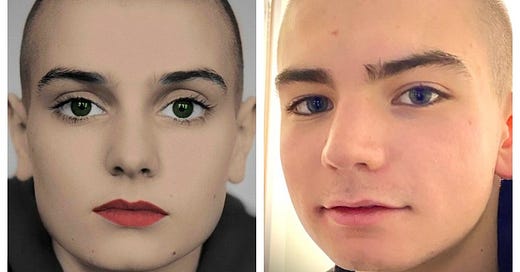Singer Sinead O’Connor called her son Shane the “light of her life”.
My baby. I don’t know how I’m going to live without you.
Tragically, Shane ended his life last week at the age of 17. He was suffering from psychological problems, likely caused or intensified by the trauma of having been taken away from her when he was just 10 years-old.
Shane had been kept away from Sinead completely for years and later only allowed to see her in supervised visits. This separation from his loving mother at such a young, developmentally-sensitive age undoubtedly contributed to, if not caused, his emotional difficulties, which eventually culminated in his death.
BATTLE TO REGAIN CUSTODY
Sinead fought like hell to get Shane back. Eventually she was allowed supervised visitation. This was incomprehensible to her, especially since she didn’t need to be supervised with her other children. None of it made sense, except, of course, in light of the Custody Crisis.
Years into her battle to regain custody, Sinead posted a tearful video saying that she would commit suicide if Family Court kept him away from her any longer. Sinead is not alone. It is common for mothers to develop depression and suicidal thoughts after losing custody of their children, and some follow through.
In 2017, after Sinead went public with her immense grief, The Women’s Coalition supported her battle, posting on social media about it. An email campaign to Ireland’s president was launched. President Michael Higgins responded to the outcry, promising he would look into it.
It is unknown what happened after that, if Sinead ever regained custody, but apparently she was in touch with him recently.
BOGUS FINDING
Sinead was Shane’s primary bond and had also been his primary caregiver. She says she was his “father and mother” up until he was taken. Sinead had never been abusive, quite the contrary. She was a loving mother, and, more importantly, Shane loved her very much and should never have been taken away from her.
There is always a bogus finding behind the switching of custody from a loving, primary nurturing mother to the father. The one used for removing custody from Sinead was that she sometimes struggled with depression. But fathers don’t lose custody if they have mental health issues—or even histories of abusive or violent behavior.
The real reason Sinead lost custody probably had nothing to do with her mental health. She likely lost custody of Shane for the same reason mothers around the world lose custody every day in family courts: judges choose to maintain men’s power over their children, hence, over their exes through the children. They completely disregard the pain caused to mothers and children by switching custody.
TACTICS
Most children want to continue living with their mother after their parents divorce. This inconvenient truth needs to be crushed to execute a successful custody switch. So, not surprisingly, established methods exist for changing children’s minds and hearts via Family Court.
An initial tactic is to isolate children from their mother, which creates a state of helplessness and suggestibility. Children are then subjected to coercive persuasion: “influence capable of producing substantial behavior and attitude change through the use of coercive tactics, persuasion, and/or interpersonal and group-based influence manipulations.”
In this defenseless, vulnerable state, children can be manipulated into believing something is wrong with their mother; their father is wonderful and deserving of custody; they will do better living with him; and to deny abuse by him, if any.
The court’s flying monkeys—psychologists, reunification therapists, and mental health professionals at behavioral modification facilities—are used to achieve this deluding, if the father cannot manage it himself by being given sole custody.
It is not known whether these tactics were used in Sinead's case, but they are common amongst mothers who've lost custody.
DISSOCIATION & TRAUMA
Children often dissociate to deal with the trauma of losing their mother and the cognitive dissonance created by the impossibility of the new false reality being foisted upon them existing in their conscious mind alongside true reality. They end up living in a type of Matrix world where they keep reality buried deep in their subconscious while enjoying the fruits of the false reality.
But, although things may seem fine on the surface, dissociation often exacts a high price psychologically. At minimum, it may cause mild anxiety, depression, emotional or experiential numbing. At worst, it can lead to severe mental health problems and dissociative disorders.
And children often respond to maternal deprivation by trauma bonding with their father, which is similar to dissociation, in that the bond is based on falsities. This creates emotional conflict within children. Whom should they be loyal to? believe? love more? side with? want to see? live with?
Trauma is the number 1 cause of mental illness, with childhood trauma causing the most impactful and enduring problems. Taking children away from loving mothers inevitably causes trauma—and judges who switch custody could not care less. They care about power, status, promotions and other kudos provided by the old boy network in return for upholding the patriarchal agenda of keeping men empowered in their families.
COURT RESPONSIBLE FOR SHANE’S DEATH
It is unknown exactly what Shane’s psychological problems were or if he used dissociation to cope with his separation from Sinead. But it’s certain that being abruptly deprived of a much-loved mother at the young, impressionable age of 10, was traumatic.
And it’s highly likely that trauma caused or exacerbated his mental health problems, which eventually led to his suicidality. If Shane had not been taken away from his mother, he would surely still be alive today.
Hence, Family Court is likely responsible for Shane’s death.
Shane’s fatality adds to the numerous children who have died by suicide, drug overdose or murder following a judge giving custody to an abusive or self-serving father. Countless children around the world are suffering today, not to mention all the adults traumatized as children by the Family Court system and the mothers who fought for them.
It’s Time for Women to Unite and Demand a New System Where Judges Do Not Have the Power to Take and Harm Our Children.
RIP Shane
CONDOLENCES Sinead

We’re almost at 5,000 subscribers so please help us get there!






If this can happen to Sinead O'Connor and her son every family is at risk. Family courts and Child Welfare around the world must be changed to be more empathetic to parental and Child needs, including and perhaps especially Canada. I for one, will do my share to see this happen.
It is worse than death.
I do not have the words.